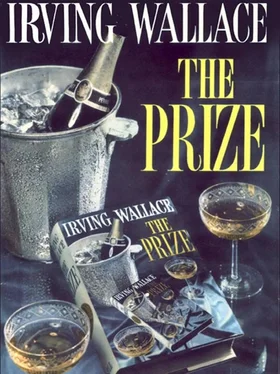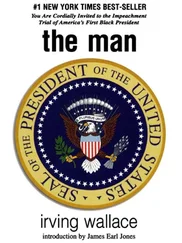The glassed-in veranda facing the street-where the music was soft and the voices hushed, and one could look out and take pleasure in the tall, well-dressed Swedish men and tall, well-dressed Swedish women passing by in the prosperous thoroughfare-was the choice site for dining. And here, through Krantz’s intervention, Dr. Hans Eckart, of East Berlin, Germany, and Professor Max Stratman, of Atlanta, United States, had been seated half an hour before.
Now Eckart had ceased speaking. He waited as the empty consommé dishes were removed, and their waiter served rare beef cuts off a wagon, and the sommelier brought fresh beers and poured them.
From beneath his half-closed eyelids, arms folded on his vest, Stratman pretended to watch the elaborate service, but actually observed the man across the table from him. Their meeting in the lobby, their walk to the restaurant, their beginning at the table, had come off easily and without incident. To Stratman’s eyes, Eckart, except for the thinning and greying of his hair, and wrinkles at his neck, and an air more authoritative than before, had not changed since the war years. The monocle was still caught in place, and it reflected light whenever he moved his head. The scar was as livid and dramatic as before. The corded Prussian rigidity of the face was inhuman as it had ever been. All that had really changed, Stratman decided, was that Eckart had not been given to wasted words, but in the past half-hour he had been relatively garrulous, and pointless, in his conversation. Stratman made up his mind that Eckart was nervous. Since he, himself, was not, he felt comfortable, and remained calm.
In the half-hour, after profusely congratulating Stratman on becoming a Nobel laureate, Eckart had devoted himself to reminiscing about the lighter side of the past that they had shared in common. He had recalled anecdotes of their long days in the Kaiser Wilhelm Institute, and joked about their colleagues, and provided information on those who had survived and what had become of them. Eckart had a clever way of making that gruesome period of enforced confinement, of toil for the devil, seem congenial and sport, as if they had all had membership in a jolly men’s club, and as if this was now their best memory of the past.
As the waiters tactfully disappeared, Stratman realized that he did not like this spurious talk, that his dinner companion had never really been his friend (but only someone who had come and gone from the laboratory for two years), and that he was too old to fritter away his time on inconsequential prattle.
Eckart lifted his beer stein. ‘ Bitte -your health, Max.’
‘To yours,’ said Stratman, and he drank, and then set his thick glass down decisively. ‘You seem to have tremendous affection for the past, Hans. I have less. My only affection for the time we shared is a memory of my brother Walther. Your cable spoke of him. I cannot imagine why. Maybe you are ready to tell me.’
Eckart, who was no longer used to brusqueness, frowned, but tried to convert displeasure into nostalgic pain. He had wanted the conversation to go his way, to be its sole pilot, but now he remembered that Max Stratman had often been called headstrong and impatient. He pretended to give consideration to his reply to measure it, as he efficiently sliced his roast beef.
‘What do you know of Walther’s death?’ asked Eckart.
‘What do I know? I know that when I was in England, before emigrating to America, the British advised me that he had been arrested by the OGPU immediately after my escape, for his role in it, and deported to a Siberian labour camp. There, a month or two later, he died or was put to death-I do not know which-even while I was still in the custody of the Americans in Germany. That is all I know.’
‘You have been misinformed,’ said Eckart.
‘Have I?’
‘Absolutely, my old friend. The British were propagandizing you. They wished an alliance with your hatred. Siberia? Labour camp? What a crazy story that is. No, believe me, I have the facts. Walther was not sent to Siberia but to a nuclear laboratory seventy miles from Moscow. When he was being screened, it was discovered-from a paper he had published-that he was an expert on the bubonic plague. At once, he was offered a better post. He was asked to join a team of other researchers, led by the renowned Dr. Viktor Glinko, engaged in experiments concerned with biological warfare-bacteria bombs-a magnificent attempt to simulate, for purposes of peace, the bubonic plague that killed five million people in France and England in 1348. In the initial experiments, there was an accident, many were killed, and Walther was among those declared missing, presumed dead. I give you my word, Max, and I believe it will relieve you to know this. Walther was never arrested or pressed into slave labour. He was intrigued by this new field. He volunteered to enter into it, and undertook a crash course that converted him from physicist to bacteriologist. He was given every consideration and comfort, until the end. And why not? You know how the Soviets respect scientists.’
‘So he volunteered to develop germ bombs?’
‘Yes.’
‘I am sorry, Hans. I do not believe you. I think I knew my older brother better than you. He would have been incapable of such a thing.’
‘Come now, Max, I understand your love for him, but that is all long ago, and you must be sensible. What was so wrong about that? He was an investigator, above petty politics. It was a challenge, and he was interested. Had he not always been interested? I have read a reprint of his scientific paper on the bubonic plague-’
‘Child’s play,’ interrupted Stratman. ‘He wrote that silly paper when he was in his twenties. Disasters of history were a hobby with him, and to have some fun, a small sensation-oh, possibly because he wanted attention, his vocation was so routine and dull-he applied the scientific attitude to the bubonic plague of 1348. Such child’s play is one thing. But to bottle black death for the Russians is quite another, and I will not accept it.’
‘His so-called child’s play was a bit more lethal,’ said Eckart insistently. ‘The Russians saw that, and so did I, when I read Walther’s paper. I do not refer to the history-all the detail about the bubonic plague killing off one-third of the population of France and England. I refer to Walther’s prophetic speculations on the possibilities of one day compounding biological agents to produce artificially the same epidemics as those once produced by the buboes-type plague and the pulmonary-type plague.’
‘I repeat-juvenile strutting. It was his only weakness. Walther was far too kind and good-’
‘Be that as it may. It is useless to labour the fact further. But you will not deny this, my friend-Walther did work on nuclear fission with us throughout the war.’
‘Of course, he worked on nuclear fission, as I did. We did it because we knew that the programme was so depleted of funds, so hamstrung by Hitler’s politics, that Germany could never have an atom bomb before the Reich was defeated. If there had been any other possible outcome, Walther and I would have died in Hitler’s ovens before co-operating. And Walther would have let his wife and daughter die, too.’ Stratman snorted with anger. ‘As it was, Walther’s wife died in Auschwitz anyway, and for nothing.’
Eckart quickly wore his mask of mourning. ‘That was a pity, a cruel mistake. I agree it was for nothing. I deplore that tiny Nazi gang as much as-’
‘What do you mean-tiny Nazi gang? The guilt was national, all Germany ’s guilt, not the mere madness of a small political party.’
‘Come now, Max, you cannot believe that, no matter how bitter you may be. People are sheep. They go along. They have no idea what is happening around them. Each lives at his hearth, in his block, and no farther.’
Читать дальше












